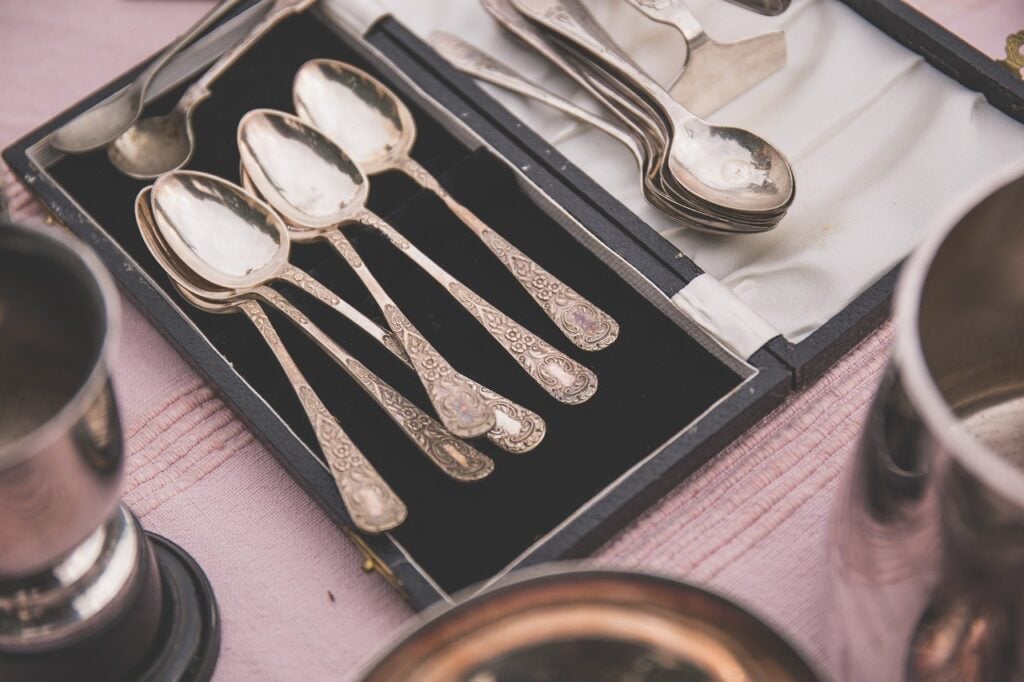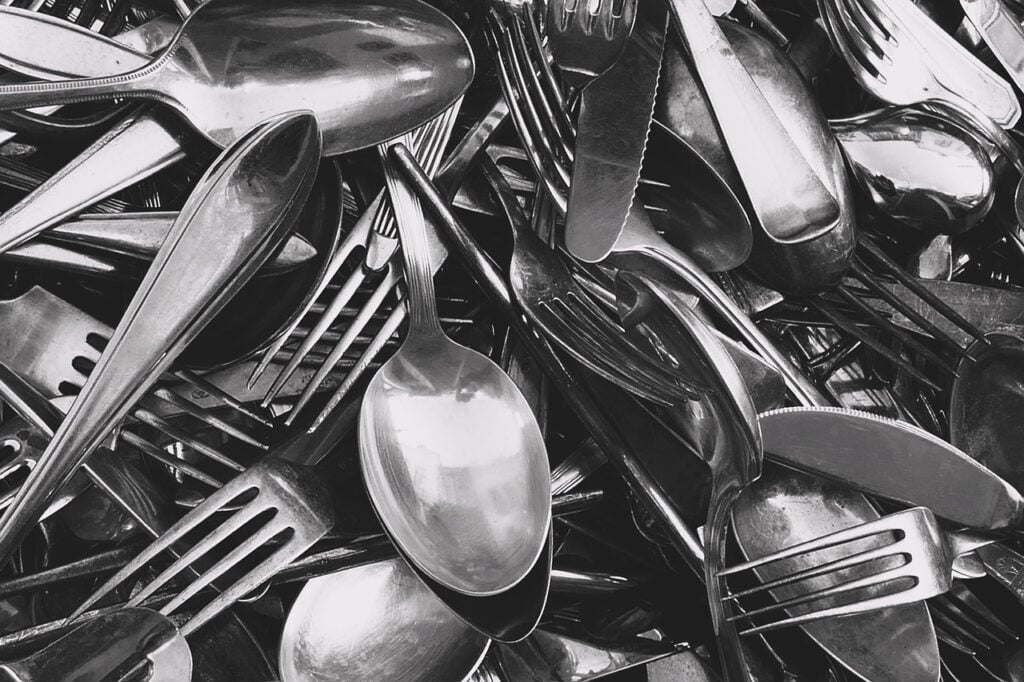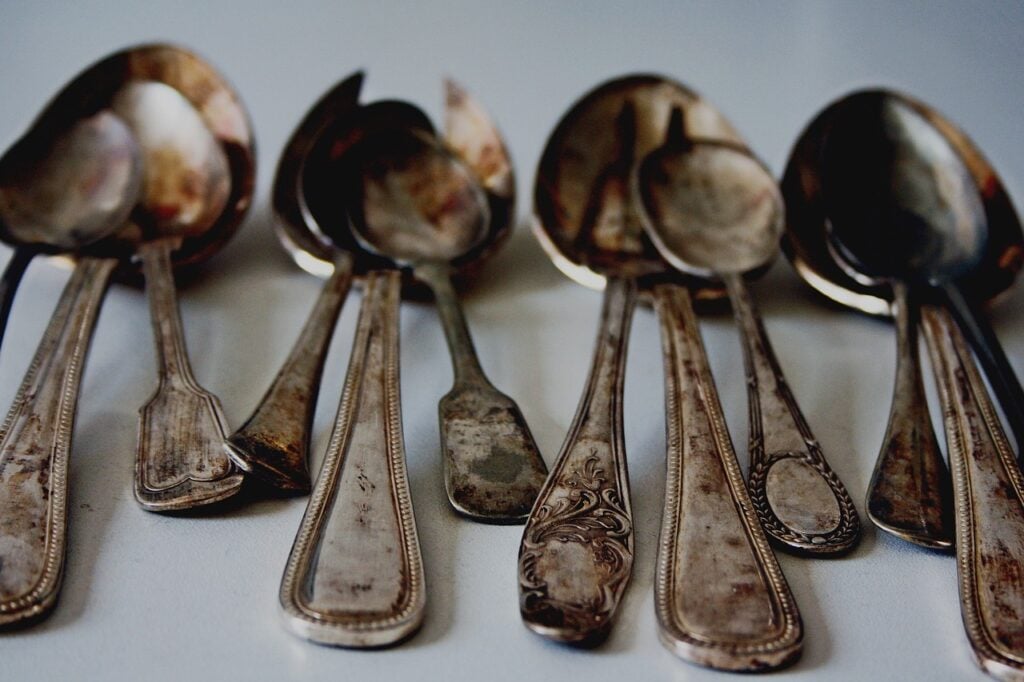Previously: Answers In The Dark.
There’s a figure in Slavic folklore called the domovoy, or Домовой. It lives inside the family home, often behind or under the stove or oven, or in the attic, or in the dark cupboard under the stairs that no one ever goes into if they can help it. When it’s feeling benevolent, it may help with the chores around the house — and, if you’re feeling brave, you can even learn how to summon a domovoy and have a conversation with it. All it takes is four spoons and a couple of strips of paper. For that reason, I tend to think of this folkloric ritual game as “the Four Spoons Game.”

“Domovoy” — or “domovoi,” as it may also be spelled — is sometimes translated into English as “brownie,” although they’re not quite the same thing. True, they’re both generally understood to be household spirits; however, while the English and Scottish brownie is usually thought of as an industrious and only occasionally mischievous elfin household helper, the Slavic domovoy holds much more power within its given household, functioning almost more like a family patriarch. Indeed, the domovoy, which is often depicted as a wizened old man with a beard, may in fact be the spirit of one of the family’s oldest progenitors. It demands cleanliness and tidiness; it discourages bad behavior; and if you anger it, you’d be better be prepared for the consequences.
[Like what you read? Check out Dangerous Games To Play In The Dark, available from Chronicle Books now!]
The four spoons method of summoning a domovoy has been a fixture of childhood superstition for at least several decades; one of the stories detailing this method collected in the Lobachevsky State University of Nizhny Novgorod’s online folklore archive dates back to 1998 — making it at least 25 years old. Various forum and blog posts from the past 10 to 15 years also contain a number of accounts from folks who said that they played the game when they were children, so the timing checks out there, too.
Could it be older? Of course; the domovoy itself, after all, is literally ancient — it’s a pre-Christian figure. And since the items required to play this game are decidedly low-tech, it could be very old, indeed.
There are many ways to summon a domovoy, but this version is usually used as a fortune-telling game or a more general information-gathering game: Once you’ve successfully summoned your household’s domovoy, you can ask it any yes-or-no questions you like. I’ve also seen it played as a wish-granting game, too, though, so my sense is that it’s pretty adaptable, depending on what you want to get out of it.
Slight spoiler: There’s a reason this one “works,” although it’s perhaps not the reason you might expect. To see what’s actually going on here, you can watch this video or this YouTube Short — both show how the trick actually works. I replicated the effect myself using these two videos as guides, so I can confirm that they’re correct. If you’d rather keep the magic alive for yourself, though — if you feel you’re better off not knowing — then feel free to give those videos a skip.
Either way:
Play at your risk.
Players:
- A least one principal.
Requirements:
- Four spoons, ideally teaspoons, and ideally identical.
- A sheet of standard, A4, letter-sized paper.
- Scissors.
- A ruler. (Optional.)
- A writing implement. (Optional.)
- Yes-or-no questions — at least four of them. These questions may concern any or all of the following: Information you seek and have no earthly way of learning; knowledge you desire to which you would not otherwise have access; your own future; or the futures of your loved ones.
- A quiet room inside your own home in which to play.
Instructions:
Making The Preparations:
- You may begin at any time.
- Using the scissors, cut four identical strips, lengthwise, from the sheet of paper. Suggested dimensions for these four strips of paper are one to 2.25 centimeters by 20 to 30 centimeters, or approximately half an inch to an inch by eight to 12 inches. If using the ruler and writing implement, you may mark out the suggested dimensions on the sheet of paper before cutting the strips.
- Fold each of the strips of paper in half. When folded, the strips should measure 10 to 15 centimeters in length, or approximately four to six inches long.
- Take up one of the folded strips of paper and one of the spoons. Place the neck of the spoon inside the folded strip of paper, nestling it all the way in the crease. If done correctly, the spoon will look somewhat like it is wearing a scarf.
- Now — without removing the spoon from the paper’s crease — carefully wind, wrap, or roll the paper’s tails together around the spoon’s neck. If done correctly, the spoon will now look somewhat like it is wearing a collar.
- NOTE: If you require a visual reference for how to complete these two steps, you may find this video helpful.
- Repeat Steps 4 and 5 with the remaining three strips of paper and spoons.
- When all four spoons have been prepared, lay them out on a flat surface in the shape of a cross. The bowls of the spoons should meet to form the center of the cross, with the ends of the handles positioned as the tips of each of the cross’ arms.
- Now you are ready.
- Now you may truly begin.

Asking The Questions:
- First, speak aloud the following words three times: “Domovoy, domovoy, come speak to me. Domovoy, domovoy, are you here?”
- Now, unroll the paper from each of the spoons, beginning with the spoon that forms the top arm of the cross and moving clockwise. As you unroll them, you will find each of the spoons to be in one of two situations: Either the spoon will still be trapped inside the paper’s crease, or it will have been released from the strip of paper’s confines.
- After unrolling all of the paper strips, take stock of each spoon’s status:
- If all four spoons remain inside their paper’s crease: The ritual has failed; the domovoy has not come, or does not wish to speak with you. Do not proceed. Thank the domovoy for their time, apologize for bothering them, and clear up your supplies. You may try again another time if you wish.
- If at least one spoon has been released from the paper: The ritual has succeeded; the domovoy has arrived, and is willing to speak with you. You may proceed.
- If the domovoy has agreed to speak with you, wind the spoons in the strips of paper again in the same manner as in Making The Preparations: Steps 4 and 5. When the spoons have been rewrapped in the strips of paper, arrange them in the cross formation once again.
- Now, ask your first question aloud. At the end of the question, also speak the following words: “If yes, then release the spoon; if not, then do not release it and leave it as it was.”
- When you have finished asking the question, take up the spoon that forms the top arm of the cross and unroll the paper from it. After unrolling the paper strip, observe the spoon’s status:
- If the spoon remains inside the paper’s crease: The answer to your question is no.
- If the spoon has been released from the paper: The answer to your question is yes.
- Now, ask your second question aloud. At the end of the question, also speak the following words: “If yes, then release the spoon; if not, then do not release it and leave it as it was.”
- When you have finished asking the question, take up the spoon that forms the right arm of the cross and unroll the paper from it. After unrolling the paper strip, observe the spoon’s status:
- If the spoon remains inside the paper’s crease: The answer to your question is no.
- If the spoon has been released from the paper: The answer to your question is yes.
- Continue in this fashion as you ask your third and fourth questions. To receive the answer to your third question, unroll the paper from the spoon that forms the bottom arm of the cross. To receive the answer to your fourth question, unroll the paper form the spoon that forms the left arm of the cross.
- If, after asking your four questions, you are satisfied with your answers and do not wish to ask anything further, proceed directly to Bidding Farewell: Step 1.
- If, however, you wish to continue, you may re-wrap the spoons in the paper strips, arrange them in the cross again, and ask four more questions. You may continue in this fashion, asking questions in sets of four, for as long as you wish — although it is not recommended that you do so for too long. Do not become too demanding, and do not overstay your welcome. When you are done asking all your questions, proceed to Bidding Farewell: Step 1.
Bidding Farewell:
- When you have finished asking your questions, put down the final spoon. At this point, all of the spoons should be unrolled. Do NOT re-roll them; leave them as they are.
- Then, speak aloud the following words three times: “Domovoy, domovoy, thank you for your help. Domovoy, domovoy, you are now free to go.”
- You may now clear up your supplies and end the game. You may play again another time if you wish — although you would be wise not to abuse the domovoy’s good will.
Additional Notes:
This game is adaptable and flexible, and may be played in any number of additional ways. Some of these methods involve only slight adjustments, while others offer different and unique playing experiences. Suggestions include, but are not limited to, the following:
More than one player may participate in the game if desired. During the question-and-answer portion of the game, players should take turns asking questions. It is not recommended that more than four participants play during a single game.
Bystanders may be present, even if not directly participating in the game. Any bystanders observing the proceedings should remain unobtrusive and silent until the game has concluded. Bystanders may not ask questions of the domovoy during the course of the game.
One variation of this game positions the spoons such that the ends of the handles form the center of the cross, with the bowls positioned as the tips of the cross’ arms. Accounts of this version are fewer and further between than those describing the spoons positioned the other way, with the bowls at the center the cross; however, enough accounts exist that this arrangement may be considered an alternate method of play. It is unknown which arrangement, if either, is more effective.
Instead of a cross, the spoons may be arranged in an X shape, with the bowls meeting at the center of the X and the handles pointing outwards (see here). It is unknown which arrangement, if either, is more effective.
Instead of summoning a domovoy, you may attempt to summon the spirit of a deceased loved one. Should you choose to summon the spirit of a deceased loved one, substitute the following words during Asking The Questions: Step 1 and Bidding Farewell: Step 2, supplying the name of the deceased where specified:
- In Asking The Questions: “Spirit [name of deceased], come here now. Spirit [name of deceased], if you are here, hear us and answer our questions!”
- In Bidding Farewell: “Spirit [name of deceased], we thank you for your help, from now on you are free, go back to where you came from!”
NOTE: If you wish to summon a domovoy, you MUST play the game inside your own home. If you wish to summon the spirit of a deceased loved one, however, you may play in other locations.

Regarding Wishes:
If you wish to play this game as a wish-granting game, rather than an information-gathering game or a fortune-telling game, you may do so in one of two ways:
- You may play the game as written, asking for specific wishes to be granted instead of questions regarding information or knowledge. Should you choose to ask for wishes to be granted, the answers may be interpreted as follows:
- If the spoon remains inside the paper’s crease: Your wish will not be granted.
- If the spoon has been released from the paper: Your wish will come true.
- Or, you may gather together three additional participants for a total of four players, a large tray or plate, and a white towel, and play as follows:
- After you have summoned the domovoy, and it has agreed to speak with you, you may each take one spoon and one strip of paper. Each player should wind their spoon in the paper as previously described. As they do so, they must silently make their wish. Do not speak your wishes aloud; focus on them inside your mind only.
- Once the spoons have been wrapped, and the wishes made, each player should then place their spoon on the tray or plate in either the cross or X formations previously described.
- Now, unfold the towel and lay it carefully on top of the spoons, covering them from view. Then, carefully grab the edge of the tray or plate and spin it, make seven to 10 complete rotations.
- Once the tray or plate has come to a complete stop, each player should reach under the towel and pick up the spoon closest to them. They may then unroll the paper from the spoon. The answers for each wish may be interpreted as follows:
- If the spoon remains inside the paper’s crease: The wish will not be granted.
- If the spoon has been released from the paper: The wish will come true.
NOTE: Should you choose to play the game as a wish-granting exercise, rather than an information-gathering or fortune-telling one, it is NOT recommended that you play MORE than one round.
Do not request the granting of more than four wishes in total.
Don’t be greedy.
There are consequences for bad behavior, after all.
The domovoy doesn’t hold with rudeness.
***
Follow The Ghost In My Machine on Bluesky @GhostMachine13.bsky.social, Twitter @GhostMachine13, and Facebook @TheGhostInMyMachine. And for more games, don’t forget to check out Dangerous Games To Play In The Dark, available now from Chronicle Books!
[Photos via freestocks-photos, Kranich17, franziska_geipel/Pixabay]